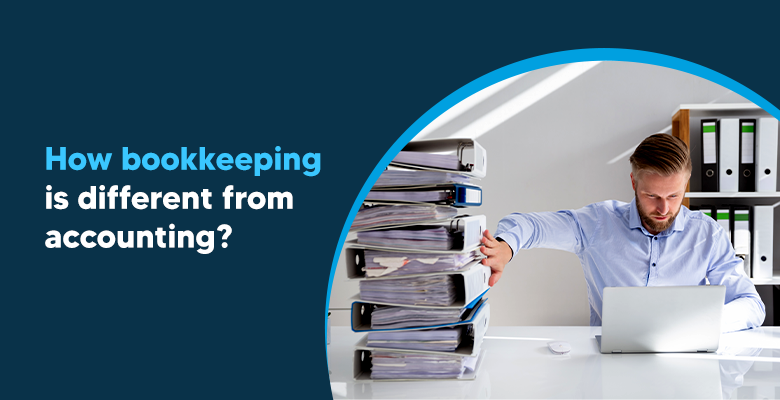When the majority of people think about the difference between bookkeeping and accounting, they are unable to nail the differentiation between each process. While bookkeepers and accountants share common goals, they support your business at various stages of the financial process.
Basically, bookkeeping services is more transactional and administrative, concerned about recording financial transactions. Accounting is more subjective, giving you insights into your business’s financial health based on bookkeeping data.
In this aid, we’ll explain the functional differences between bookkeeping and accounting and the differences between the roles of bookkeepers and accountants.
Tasks of Bookkeeping
- Record and categorize daily payments and expenses.
- Send out customer invoices and keep track of payments received.
- Conduct bank reconciliation every month.
- Generate monthly financial statements.
- Process payroll
- Prepare books for the accountant
- Provide year-end financials and tax documents to the accountant.
Tasks of Accountant
- Prepare to adjust entries
- Analyze the cost of operations
- Advice to business owners during financial decision making
- Review and analyze financial statements
- Assess financial health and make financial forecasts.
- Perform audits
- Filing tax returns, tax planning, and tax advice are all part of the job.
The Functions of Bookkeeping
In small business bookkeeping, the process of recording daily transactions in a streamlined way is a key component in gathering the financial data needed to run a successful business.
Bookkeeping includes
- Recording financial transactions
- Debits and credits must be posted.
- Delivering invoices
- Preparation of financial statements (balance sheet, cash flow, and income statement)
- Upkeep and adjustment of subsidies, general ledgers, and accounts
- Completing payroll
Maintaining a general ledger is one of the basic components of bookkeeping. The general ledger is a basic document where a bookkeeper records the sums from sales and cost receipts. This is referred to as “posting.” The more sales are finished, the more regularly the ledger is posted. A ledger can be made with specialized software, a spreadsheet, or just a lined sheet of paper.
The complexity of a bookkeeping system regularly depends upon the size of the business and the number of transactions completed daily, weekly, and monthly. All sales and purchases made by your business should be recorded in the ledger, and certain things need supporting documents.
The Function of Accounting
Accounting is a significant process that uses financial data compiled by a bookkeeper or entrepreneur to produce financial models.
The accounting system is more subjective than bookkeeping, which is generally transactional.
Accounting includes:
- Preparing adjusting entries (recording costs that have occurred but aren’t yet recorded in the bookkeeping process)
- Reviewing organizations’ financial reports
- Analyzing the costs of operations
- Completing income tax returns
- Aiding the entrepreneur in understanding the effect of financial decisions
A key part of the accounting system is analyzing financial reports to help you make informed business decisions. The outcome is a better understanding of actual profitability and consciousness of cash flow in your business. Accounting turns the data from the general ledger into insights that uncover the status of the business, and the way the organization is progressing. Entrepreneurs will regularly seek bookkeepers for help with strategic planning, breaking down their financial position, forecasting, and tax filing.
Accountant vs. Bookkeeper Roles
Bookkeepers and accountants once in a while do similar work but have a different skill set. In general, a bookkeeper’s job is to record transactions and keep you financially organized, while accountants provide consultation, analysis, and are more qualified to advise on tax matters.
Bookkeeper credentials
Regularly, bookkeepers aren’t expected to have any formal education. To be successful in their work, bookkeepers should be sticklers for precision and learn about key financial aspects. Generally, the bookkeeper’s work is managed by either an accountant or the entrepreneur whose books they are doing. So bookkeepers can’t consider themselves “accountants.”
Accountant credentials
For the most part, an individual should have a certification in accounting to meet all requirements for the title of an accountant. For those that don’t have a particular degree in accounting, finance degrees are often considered a sufficient substitute.
Accountants, in contrast to bookkeepers, are also qualified to secure additional professional certifications. For instance, accountants with experience and education can acquire the title of “Certified Public Accountant” (CPA), the most widely recognized type of accounting designation. To become a CPA, an accountant should pass the Uniform Certified Public Accountant examination and have experience as a professional accountant. These are necessary accreditations and are a determining factor in the cost of an accountant.
For more information about bookkeeping contact Entelyglobal Solutions pvt ltd at
080 4865 5969 or visit our website at https://entelyglobal.com

